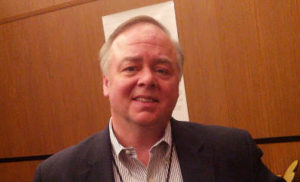This week on The Score – A presidential scholar reflects on the late George H.W. Bush. Seventy-seven years later, we remember Pearl Harbor. A lawyer explains how the Library of Congress violates the First Amendment. Our film critic wonders if we misunderstand Ebenezer Scrooge. We ask, what do college libertarians do?
http://bearingdrift.com/wp-content/uploads/TheScore_Dec08-fullhour.mp3 [1]George H.W. Bush
This week America and the world bade farewell to President George H.W. Bush, who died at age 94 on November 30. The Score reached out to presidential scholar Barbara Perry at the Miller Center for Public Affairs at the University of Virginia, who has edited a book about the Bush presidency (with Michael Nelson) called 41: Inside the Presidency of George H. W. Bush [2].
In April, Dr. Perry was our guest to talk about former First Lady Barbara Bush [3] and, in June, we recalled the fiftieth anniversary [4] of the assassination of Robert F. Kennedy.
Our interview opens with a brief excerpt [5] from President Bush’s 1992 State of the Union address, courtesy of the Miller Center’s extensive archive of presidential speeches:
I pride myself that I’m a prudent man, and I believe that patience is a virtue. But I understand that politics is, for some, a game and that sometimes the game is to stop all progress and then decry the lack of improvement. [Laughter] But let me tell you: Far more important than my political future and far more important than yours is the well-being of our country. Members of this chamber are practical people, and I know you won’t resent some practical advice. When people put their party’s fortunes, whatever the party, whatever side of this aisle, before the public good, they court defeat not only for their country but for themselves. And they will certainly deserve it.
Suing the Copyright Office
A Richmond publisher of old, rare, and esoteric books has fallen afoul of an obscure law. If the law is fully enforced, Valancourt Books [6] could end up paying hundreds of thousands of dollars in fines to the Library of Congress, something that could easily put it out of business. Coming to the rescue [7] is the Institute for Justice, a public-interest law firm headquartered in Arlington, Virginia.
I spoke to IJ attorney Bob MacNamara about the law suit he has filed on behalf of Valancourt Books and its publisher and general editor, James D. Jenkins [8]. IJ’s web site provides a nutshell introduction to the key elements of the case:
It turns out a little-known provision of federal law makes it illegal to publish a new book in the United States without providing the federal government with two free copies. The law itself dates back to the former federal copyright system, under which the only way to secure the protections of copyright was to formally register your work with the federal government and publishers were required to deposit copies of their books in exchange for registration. But under modern copyright law, copyright protection applies automatically to anything someone writes. But the deposit requirements is still there, which means the law now requires two free copies of anything copyrightable that is published in the United States. Valancourt’s books (all of which contain at least some new material, like scholarly introductions or footnotes, that is copyrightable) technically qualify. And the federal government—even though the justification for this requirement has long since vanished—intends to collect.
Dickens Reconsidered

It’s the holiday season, which means there are multiple ways to read, hear, or see Charles Dickens’ classic story, A Christmas Carol [10].
This week, The Score’s film critic, Tim Hulsey, examines this ubiquitous work and detects a “ghost of an idea” in Dickens’ socially conscious mind. Tim’s reinterpretation of this holiday staple may surprise many of you.
Remember Pearl Harbor
As noted in these pages yesterday [11], this week marked the 77th anniversary of the Imperial Japanese military’s attack on U.S. army and navy facilities in Pearl Harbor, on the island of Oahu in Hawaii.
For many Americans, the news of the battle arrived through a bulletin delivered by CBS Radio announcer John Charles Daly (who later became well-known as the host of the long-running panel show, What’s My Line?, Sunday nights on CBS-TV).
 A few years ago, Craig Shirley, a biographer and associate of President Ronald Reagan, wrote a book called December 1941: 31 Days that Changed America and Saved the World [12], which offers a day-by-day account of that transformative month. When he came to the Virginia Festival of the Book in 2014, I asked him about the book and his interest in the history of World War II. First, however, I wanted to find out something about President Reagan, since he is also the author of Reagan’s Revolution: The Untold Story of the Campaign That Started It All [13] (2010) and Rendezvous with Destiny: Ronald Reagan and the Campaign That Changed America [14] (2011), among other books [15].
A few years ago, Craig Shirley, a biographer and associate of President Ronald Reagan, wrote a book called December 1941: 31 Days that Changed America and Saved the World [12], which offers a day-by-day account of that transformative month. When he came to the Virginia Festival of the Book in 2014, I asked him about the book and his interest in the history of World War II. First, however, I wanted to find out something about President Reagan, since he is also the author of Reagan’s Revolution: The Untold Story of the Campaign That Started It All [13] (2010) and Rendezvous with Destiny: Ronald Reagan and the Campaign That Changed America [14] (2011), among other books [15].
Libertarian Youth
College campuses have always been hives of political activity, even as far back as the Middle Ages, when the concept of the university was first taking shape.
 Nowadays, you’ll find groups of activist Republicans, Democrats, Socialists, and Libertarians, among others. At the University of Virginia, one group has been carrying the free-market, free-minds message for about three decades. It’s called Students for Individual Liberty [16], and I spoke to its current president, third-year urban planning student Harrison Premen, to find out what he and his classmates are doing to promote the liberty movement.
Nowadays, you’ll find groups of activist Republicans, Democrats, Socialists, and Libertarians, among others. At the University of Virginia, one group has been carrying the free-market, free-minds message for about three decades. It’s called Students for Individual Liberty [16], and I spoke to its current president, third-year urban planning student Harrison Premen, to find out what he and his classmates are doing to promote the liberty movement.
From the Archives
Finally, this week, we have a nugget from the archives. Seven years ago today, on December 8, 2011, I spoke with Reason magazine’s movie critic, Kurt Loder, about his book of essays called The Good, the Bad and the Godawful: 21st-Century Movie Reviews [17]. A book like this might be a perfect stocking stuffer for the film lover in your life. (Loder used to write for Rolling Stone and may be best known as a news reader and host on MTV.)
The Score will be back next week with more news, reviews, and interviews. Our next episode will air on Bill of Rights Day (December 15), marking 227 years since the first ten amendments to the U.S. Constitution were ratified. Be sure to come back to listen and tell your friends where to find us. Remember that Bearing Drift readers can participate in the conversation by leaving comments in the space below.